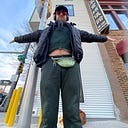9/11: Never Forget What?
In August of 2001, I visited New York City with the goal of determining where I’d move next. While infinitely livable, my then-Boulder, Colorado home lacked the global scale I craved as an ambitious 25 year-old. I wanted to make it big, and there was no place bigger than New York City at the time.
The other reason for the visit was to attend my New-Yorker cousin’s high-society wedding upstate in Rhinebeck. My NYC visit would be split between the wedding and a romp around lower-Manhattan with my friend Daniel, who moved from Boulder to the East Village a couple of months earlier.
Before the wedding weekend, Daniel and I hit the clubs in the still-cool Meatpacking District, ate falafel from Mamoun’s at 4am, and watched the city sleep while sitting on Daniel’s sixth-story walk-up rooftop at 1st Ave and 2nd Street above the Pakistani Deli. On that rooftop, we looked south at the twinkling Trade Towers and shared our hubristic ambitions for world domination, as young, testosterone-oozing New Yorkers (or New Yorker wannabes) are wont to do.
I returned to Colorado resolved to move to New York City, not the Bay Area, which was my other possible landing spot. I preferred New York’s size, access to top-notch people and projects, and its car-free infrastructure with a 24-hour metro. NYC also had a female-to-male ratio rivaling most Felinni movies.
I got home and bought a one-way ticket to LGA and began looking for a place to live in The City.
On September 11th, 2001 another group of young men would dominate New York City and the world. Regardless of one’s beliefs about the causes of 9/11, no one will argue that there was a “pre-9/11” and a “post-9/11” America.
The toppling of the trade towers was a devastatingly effective blow to the security of Western society and the global financial system that undergirded it. Since 1973, the towers stood as tuning forks for the rhythms of international commerce — a remote control center where the resources and labors of far-off lands and people were bought, sold, and traded. The symbolic significance of the towers’ destruction cannot be understated.
The attacks were also unprecedented. The US, while prodigious at attacking foreign nations, had not had been attacked since Pearl Harbor, or the War of 1812, depending on what you consider the US. By 2001, safety from external foes was an inalienable more sacred than — and usually coming at the expense of — life, liberty, and the pursuit of happiness.
Lower Manhattan was still smoldering when I arrived in NYC in October, 2001. With wreckage in plain view, the attacks dealt a profound and graphic trauma to the New Yorker psyche.
As I settled into the city, I began to comprehend a less-obvious trauma inflicted by September 11th. The high-finance and international trade fueled Bacchanal of 20th-century New York City had become covered in blood. The 200 year-old illusion that Americans — particularly its monied-elite — could fully shield themselves from the downstream impacts of their excesses, of their political and economic meddling, and of their war-mongering was dispelled.
Yet rather than reflecting on how they helped inspire the 9/11 attacks, Americans went looking for someone to blame. The criteria for the bad guys is they had to be Muslim and they couldn’t live somewhere with strategic military or economic value to the US. While 15 of the 19 attackers were from Saudi Arabia, that country has massive oil reserves and open diplomatic relations with the US, so wars were waged on Iraq and Afghanistan. In NYC, Mayors Giuliani and later Bloomberg expanded and militarized the NYPD so nothing bad would happen to “innocent” Americans ever again. America’s various safety measures produced a failed state in Iraq, a pointless, 20 year war in Afghanistan, and a domestic carceral megaplex — all of which bred further international and domestic hostility towards America.
The American obsession with safety and vindictiveness changed the national character. In the decades following the 9/11 attacks, the US, once known for its work ethic, continued to offload the majority of its labor to exploited immigrants and overseas workers; once known for its rugged individualism, offloaded its cognition to safety-obsessed, big-institution-supporting, social media-implanted groupthink; once known for its courage, put its faith in governmental protection (cops, military, politicians) who provided safety from real and (mostly) imagined threats. NYC, once known for its creative culture, replaced underground theaters with private-equity-backed productions of Hamilton for busloads of shopping-bag-toting tourists; once known as a haven for outcasts and weirdos, became the premier destination for a peripatetic population of wealthy, international pleasure-seekers hellbent on stripping the city of its cultural and pecuniary resources; once known for grit, became the city of fancy cupcakes and the second largest police force in the world.
While outsourcing its labor, the US has in-housed its terrorist attacks since 9/11. The country is burning itself through hyper-consumption and SUV-traversed suburban sprawl; it’s killing its population with preventable, HFCS-fed obesity epidemics and myriad addictions (opiates, food, screens, etc.); it’s bankrupting itself with the endless issuance of unrepayable debts; and it’s fracturing its unity with broken homes and a media system that keeps people intentionally divided, scared, and unable to distinguish true-from-false. Who needs Osama bin Laden and his small band of attackers when we there’s Fentanyl, TikTok, CNN/Fox News, the Federal Reserve, and private-equity investing?
Nothing about 9/11 was remembered except someone done America wrong, and certainly nothing was learned.
